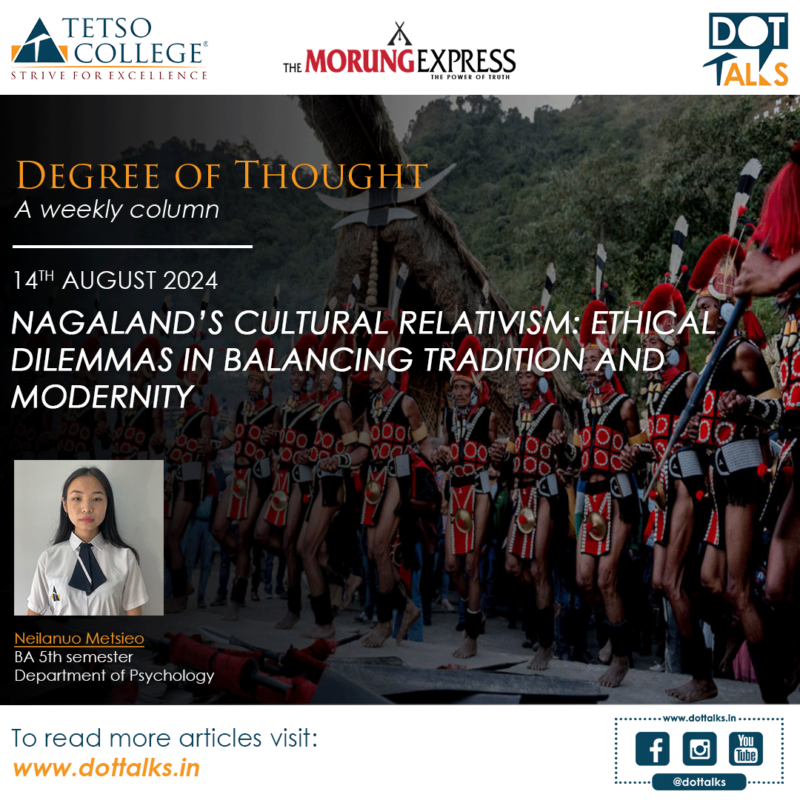 Nagaland’s Cultural Relativism: Ethical Dilemmas in Balancing Tradition and Modernity
Nagaland’s Cultural Relativism: Ethical Dilemmas in Balancing Tradition and Modernity
Nagaland, a state in the far northeast of India, is celebrated for its rich cultural heritage and deep-rooted traditions. These indigenous practices, maintained over centuries, form a vibrant tapestry of tribal customs and beliefs. However, in an increasingly interconnected world, where universal human rights and modern ethical standards are often invoked, the question arises: how should we approach the cultural practices of Nagaland? This question draws us to cultural relativism, a concept that challenges us to understand cultural practices within their own context, yet simultaneously presents complex ethical dilemmas when these practices appear to conflict with global norms.
Cultural relativism emerged in the early 20th century, primarily through the work of Franz Boas, an American anthropologist. Boas challenged the prevailing ethnocentric views of his time by arguing that cultural practices should be understood on their own terms, rather than judged against a single, often Western-centric standard. His
approach laid the groundwork for a more nuanced understanding of cultural diversity.The key tenet of cultural relativism is grounded in the principle that cultures should be understood based on their own values and context, rather than through the lens of another culture.
In Nagaland, community life is deeply ingrained in village organization, where each village operates autonomously and decisions are made collectively by a council of elders. This system fosters a strong sense of communal responsibility. For instance; The Khonoma conservation initiative involves integrating traditional knowledge with
modern conservation techniques to protect local forests. This approach combines age-old practices, such as community-managed forest areas and seasonal restrictions on resource use, with contemporary methods like scientific forest management and ecological monitoring. By doing so, the community not only preserves its cultural
heritage but also enhances its ability to address modern environmental issues, such as deforestation and habitat loss. Traditional justice systems in Nagaland are handled through village courts, where disputes are resolved by community leaders based on customary laws. In a notable case from the village of Tseminyu, a dispute over land
boundaries was resolved through traditional mediation rather than formal legal channels. The village court’s decision was respected by all parties involved, highlighting the effectiveness of customary law in maintaining social harmony.
Gender roles in Nagaland are diverse, with women playing crucial roles in agriculture, trade, and domestic life. In the village of Phek, women are known for their expertise in weaving traditional shawls. These shawls are highly valued not only for their craftsmanship but also as symbols of cultural identity. Festivals are a vital part of Naga
culture, and the Hornbill Festival in Kisama is a key example of blending tradition with modernity. This annual event attracts global visitors and showcases performances, crafts, and rituals from different Naga tribes. For example, the Ao Naga tribe performs the “Yahong” dance, which tells stories of their ancestors through dance and music.
However, the ongoing debate focuses on balancing the economic benefits of such modernization with the need to preserve traditional conservation practices and ensure environmental sustainability.
In Nagaland, traditional practices sometimes conflict with modern human rights standards. For instance, traditional justice systems may involve practices like public shaming that diverge from contemporary legal principles, and gender roles in some tribes may not align with modern views on equality, such as male-centric leadership and inheritance practices. The ethical dilemma lies in balancing respect for these cultural practices with adherence to universal human rights principles. Traditional gender roles in Nagaland often place men in leadership positions while women manage domestic and agricultural tasks. These roles can conflict with contemporary views on gender
equality, which advocate for equal opportunities regardless of gender. While cultural relativism may justify maintaining these roles by emphasizing cultural context, modern gender equality perspectives call for reforms to align with contemporary standards and the economic development has introduced modernization in Nagaland, leading to changes in traditional practices and lifestyles. This includes shifts in agriculture and increased exposure to global influences. The debate revolves around whether cultural relativism should focus on preserving traditional practices or support their adaptation to meet modern challenges, balancing the preservation of cultural heritage with the benefits of modernization.
Cultural relativism fosters respect and understanding between different cultural groups by encouraging people to view practices from the perspective of the culture in which they occur. This approach helps avoid ethnocentric judgments and promotes empathy towards Naga traditions, especially when external criticisms arise. Understanding the values and historical significance of these practices can lead to more respectful and constructive intercultural dialogue.
In summary, understanding cultural practices within their context is crucial for fostering respect and appreciation for diverse traditions. However, this understanding must be balanced with an awareness of the ethical dilemmas that arise when traditional practices conflict with universal human rights standards. The traditional justice systems,
gender roles, and cultural rituals in Nagaland illustrate the complexity of navigating these issues, highlighting the need for a nuanced approach that respects cultural diversity while upholding fundamental ethical principles.
Degree of Thought is a weekly community column initiated by Tetso College in partnership with The Morung Express. Degree of Thought will delve into the social, cultural, political and educational issues around us. The views expressed here do not reflect the opinion of the institution. Tetso College is a NAAC Accredited UGC recognised Commerce and Arts College. The editorial team includes Chubamenla, Asst. Professor, Dept. of English and Rinsit Sareo, Asst. Manager, IT, Media & Communications.
For feedback or comments please email: dot@tetsocollege.org

